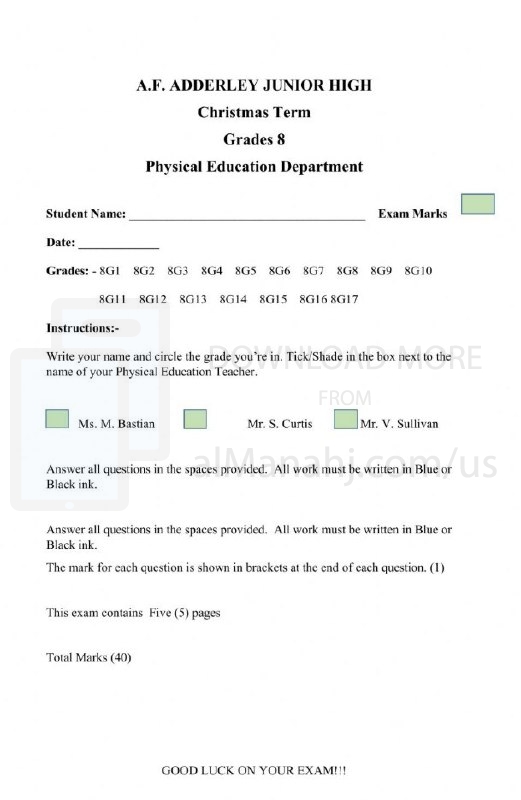| You are here: Almanahj Website ⇒ American curriculum ⇒ 8th Grade ⇒ Physics ⇒ Term 1 | ||
|---|---|---|
Physical Education Exam | ||
|---|---|---|
| Subject: Physics | ||
| 8th Grade | ||
| Term 1 | ||
| Year: 2023/2024 | ||
| Size: 588.6KB | ||
| Number of clicks: 126 | ||
| Publish date:November 08, 2023 | ||
| Added by: Eman | ||
| Last download date: 2024-09-03 10:37:37 | ||
| Updated by: Eman9966 on 2023-11-08 10:39:04 | By: theodor HVSullivan | |
| File info: A physical education exam is an assessment that evaluates students' knowledge, understanding, and skills related to physical education and fitness. It is typically administered at the end of a physical education course or unit to gauge students' comprehension of the subject matter and their ability to apply it. Here's a description of a physical education exam: 1. Content Coverage: A physical education exam covers various topics and concepts related to physical education, fitness, and sports. It may include areas such as anatomy and physiology, exercise principles, nutrition, sports rules and strategies, biomechanics, fitness assessment, and safety guidelines. 2. Exam Format: Physical education exams can be administered in different formats, depending on the educational institution or the specific course requirements. The format may include multiple-choice questions, short-answer questions, essay questions, problem-solving scenarios, practical demonstrations, or a combination of these. 3. Knowledge Assessment: The exam assesses students' theoretical knowledge of physical education concepts. It tests their understanding of key terms, principles, and theories related to exercise, sports, and physical fitness. Questions may require students to define terms, explain concepts, identify muscle groups, describe exercise techniques, or analyze scenarios related to physical education. 4. Application and Analysis: In addition to theoretical knowledge, physical education exams often assess students' ability to apply their knowledge to practical situations. This may involve analyzing sports strategies, designing fitness programs, evaluating exercise techniques, or solving problems related to safety and injury prevention. 5. Skill Assessment: Physical education exams may also include a practical component to assess students' physical skills and abilities. This can involve performing specific exercises, demonstrating proper technique in sports or fitness activities, or participating in fitness assessments such as timed runs, flexibility tests, or strength tests. 6. Time Constraints: Physical education exams are typically timed to ensure that students can complete the exam within a specified period. This helps assess their ability to manage time effectively, make accurate judgments, and respond to questions efficiently. 7. Grading and Evaluation: Physical education exams are graded based on predetermined criteria, which may include accuracy of responses, depth of understanding, application of knowledge, demonstration of skills, and adherence to safety guidelines. Grading can be based on a numerical scale, letter grades, or a combination of both. Physical education exams provide an opportunity for students to demonstrate their knowledge, skills, and understanding of physical education concepts. They help assess students' progress, identify areas for improvement, and provide feedback on their learning. Additionally, exams can motivate students to study and engage actively in physical education to achieve better results. | ||
| Downloading link Physical Education Exam |
|---|
|
1699439798.pdf
The file is being prepared for download
|
| File images |
|---|
 |